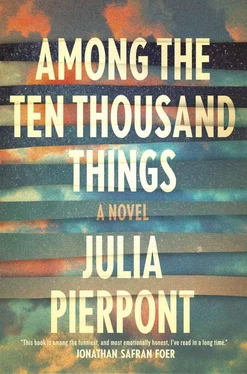Aces
You get my message?
Saw you left one
You don’t have to play it. Just happy birthday.
I sent you something in the snailmail
Where?
To your Moms
K cuz I don’t have a doorman
It’s an envelope
My very own envelope
Nothing six figures. Happy belated
Simon I love you
Love you lots
—
The cane tapping and the wheelie suitcase together sound like a horse-drawn carriage.
Sometimes a memory turned out to be only an old picture from an album, a still his brain had fooled him into believing.
And in movies, why are there dial tones anytime anybody hangs up the phone? Is this magical realism?
In the end, what killed him was a mass in his pelvis, the size of a grape.
—
The end is never a surprise. People say, Don’t tell me, Don’t spoil it, and then later they say, If only I’d known. Nights in old living rooms, on pullout couches left pushed in, light reflects against the glass where the surprises were. We thought we were living in between-time, after this and before that, but it’s the between-time that lasted.
Part Three: Jamestown and Out West, the Start of June
There are cobwebs in the bushes. See them, there, in the late afternoon, when the disappearing sun spins the fine sticky threads into gold.
—
In Jamestown, it was taking some time learning how to look at nature. On walks, Kay kept a few paces behind her mother and watched where the sidewalks ruptured enormously to allow the roots of trees. They walked the waist of the island, from their house on the east to the quieter docks on the west. “Crosstown,” her mother joked.
Her mother joked a lot. And said, “We’re in luck.” They were in luck the very first day, finding the single red cab and lady cabdriver outside the wood-paneled Kingston station, even though Simon lost a dollar to the one vending machine. They were lucky again in the car, thinking they’d gone the wrong way, when the right sign sprang up out of nowhere, and all the signs that followed began making sense. It was hard to pull onto their street without starting to pass it; the block was so small: four or five houses altogether, leaned uneasily against a hill.
Deb had made up her mind to be lucky, so they would be.
On the three-and-a-half-hour train ride, reading time had given way to thinking time. They were barely out of Stamford when her attention drifted, book to window. Her eyes ticked telephone pole to telephone pole, the slack of cable between, and she wished she had music to listen to, Joni Mitchell, a strong voice behind sad lyrics, to better indulge her sense of story, as if she were a character and this a beginning.
So many times she’d thought she was living her story. From five to twenty-five, every wish she made — on white horses, on eyelashes, on thin candles dipped in frosting — they were one wish. Getting into the right school, the right company, the right casting year after year. Just give me this next thing. Ballet and Jack were the great arcs of her life. Motherhood was a different kind of chapter, without auditions. Possibly there should have been. Kids were the only Big Thing she didn’t have to work to get, and she hadn’t expected to find herself wanting in that old way again. Now she saw how there might be yet another arc, even two. Who could say this wasn’t the first day of something — God, not the rest of her life, let’s not say that, but something, maybe good?
She let her eyelids droop, and outside the day blurred to green.
—
The house at first seemed more plant than house, but behind the wisteria and morning glories stood two floors, a roof shingled different grays, peeling white trim. There was a porch with an overhang that sagged in the middle and a screen door with the screen curled half away. Bird droppings, too, to match the siding. They weren’t even sure they’d found it, because the brush had grown up over the mailbox. “Oh.” Deb worried the glass heart around her neck, tipping her head out the cab’s window. “Here? This is it.”
“How do you not know ?” said Simon. Surprising just that he deigned to speak. He’d had to clear his throat.
Deb overpaid the woman driver, who’d talked on the ride about her own kids, all boys. “I swear, tell them one thing and they do the opposite. And me my whole life just wanting a girl to dress up.”
“They’re pretty great,” Deb said, winking at Kay, whom she never dressed up.
—
To Kay, the house looked broken. Inside the furniture suffocated under heavy plastic. The lights were out, but Gary had left a note on the kitchen table. Property to see up in Boston. Back soon, make yourselves at HOME!! Kay had no memory of Gary, your practically-uncle Gary, he used to get you toys on your birthday, remember? — Which toys? — and either Deb could not name them, or—“I don’t know, that nanoo nanoo creature, that Furby doll”—and Kay might remember the Furby but not the person attached.
“This house is one hundred years old, ” Deb said, coming up behind her with a duffel bag. She stressed the age as if it were a good thing.
“Is it even safe?” Simon shot past them, suitcase high over his head. He let it drop onto the second-floor landing and gripped both banisters, swinging his legs out from under him.
“Of course it’s safe.”
“There could be an earthquake.”
“Simon, just — cool it, okay?” Deb said. Kay watched her mother gallop down for the last of the bags. The stairs were bare wood and rounded at the edges, without carpet or rubber grips like the kind they had at school. When she turned she was face to palm with Simon’s open hand, black with dust.
—
In truth the house was worse than Deb had expected. Gary, who only ever used the place for fishing trips and painting, hadn’t mentioned any water damage, but from the base of the stairs, she’d already seen brown stains ringing the second-floor ceiling, shadows like something died up there.
From the porch the water was gray and glittering as the sun slumped low behind it. Dinner hour had settled onto the street: the clatter of silver and dishes, conversations drifting from open windows and mixing with the hum of crickets. Deb found something embarrassing in bearing witness to the ritual, the smells and sounds of families gathered together and eating.
There was nothing for them to do but eat, themselves.
—
She took the kids to a seafood restaurant a few blocks down the main strip, with outdoor seating and Christmas lights strung around. They stood staring at the menu: mussels and thirty-dollar lobster. The nicest place in town but nearly empty with high season still a few weeks away.
“Let’s do Chinese.” Simon pointed toward an orangey brick building.
Deb squinted. “I think that’s a bank.” Then she saw the sandwich board:
PEKING EMPIRE
The Empire took up only a corner of the building, which was otherwise ambiguously corporate. At the door they passed a locked freezer and a poster board advertising ice cream cones. Inside, pictures of food hung backlit above the register — the Seafood Delight, the Happy Family Special — the same photographs as at cheaper places they’d been to in the city. “Want to take it out by the water?”
“I could eat here,” Simon said.
Kay nodded yes, here.
So they stayed in, though it was clearly more of a takeout spot, with just the one table, a yellow fiberboard that pallored everything. Red tassels dangled limply from a television mounted to the ceiling. The reception was poor and they tried to guess at the movie. The food was like anything they could have ordered at home, which was what Simon and Kay seemed to like about it.
Читать дальше












